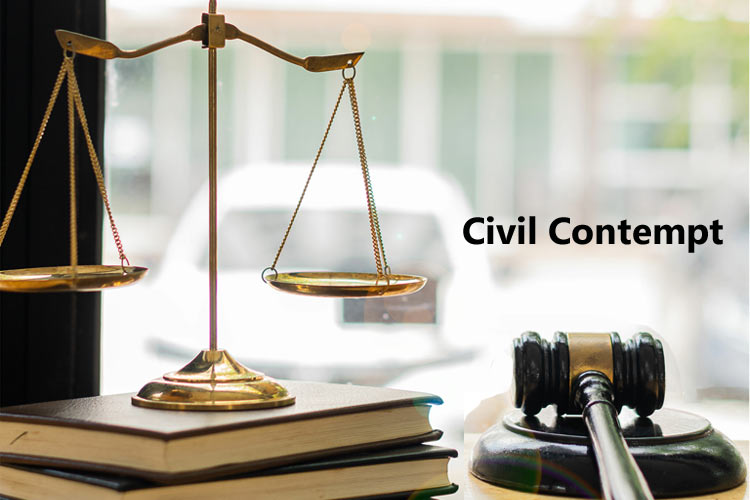Today, we are diving into the world of civil contempt charges. It is a topic that can seem daunting at first, but trust me, it is pretty fascinating once you get into it. We often hear about people being “held in contempt of court,” but what does that actually mean? And how can it lead to someone being incarcerated? Let’s unravel this legal conundrum together, shall we?
What is Civil Contempt?
First things first: civil contempt isn’t your everyday criminal charge. It is a unique beast in the legal jungle. In layman’s terms, civil contempt is the court’s way of saying, “Hey, you didn’t follow my orders, and now we have got a problem.” It is used when someone defies a court order, like not paying alimony, refusing to hand over documents, or failing to comply with a subpoena.
Why Civil and Not Criminal?
You might be thinking, “Wait, why is it ‘civil’ contempt and not ‘criminal’?” Great question! The key difference is the intent and the goal of the punishment. Civil contempt is more about compliance than punishment. The court wants you to do something, and it uses civil contempt to give you a nudge (or a shove, depending on how you look at it). On the flip side, criminal contempt is about punishing bad behavior that challenges the court’s authority.
Can You Go to Jail for Civil Contempt?
Can you go to jail for civil contempt? The short answer is yes, you can go to jail for civil contempt, but there’s a bit more to it. It is important to understand that jail in a civil contempt case isn’t about punishment; it is a means to an end. The court uses the threat of jail to encourage compliance with its orders. Think of it as a strong motivator rather than a penalty.
In civil contempt cases, incarceration serves as a tool to get someone to do something they are legally obligated to do but haven’t done yet. It could be as simple as producing a document, paying overdue support, or following a custody agreement. The unique aspect of civil contempt is that the individual has control over their incarceration. By complying with the court order, they can ‘unlock’ their release. This principle is often summed up as “the keys to the jail are in the contemnor’s hands.”
The Path to Incarceration
Now, let’s talk about the big I-word: Incarceration. How does one get from a civil charge to being behind bars? It is not as direct as you might think.
It is All About Compliance
The mantra of civil contempt is “the keys to the cell are in the contemnor’s pocket.” This means you can avoid jail time by simply doing what the court asked. The moment you comply, you are typically free to go. It is like the court saying, “Help me help you.”
The Process
- Violation: It starts with someone not following a court order.
- Court’s Response: The court might issue a warning or an order to appear in court to explain yourself.
- Hearing: If things escalate, there’s a hearing. This is your chance to plead your case.
- Judgment: If the judge isn’t buying what you are selling, they might issue a civil contempt charge.
- Jail Time?: This is where incarceration can come into play. But remember, it is all about compliance.
Real-World Implications
Sure, we can talk about the legal mumbo-jumbo all day, but what does this mean for the average Joe or Jane? Well, it is all about understanding the power of court orders. Ignoring them can lead to some serious consequences, including a not-so-pleasant stay at the government’s expense.
Common Misconceptions About Civil Contempt
Let’s bust some myths! When it comes to civil contempt, there’s a fair share of misunderstandings floating around. Here are a few common ones:
- Myth: Civil Contempt Means You’re a Criminal: Not true! Civil contempt isn’t a criminal charge. It is more about the court using its authority to enforce compliance with its orders.
- Myth: Once You are in Jail, You are Stuck There: Nope! Remember, in civil contempt, you hold the key. Comply with the court’s order, and you are on your way out.
- Myth: Civil Contempt is Rarely Used: Actually, it is more common than you might think, especially in cases involving family law, like child support or divorce settlements.
By understanding these misconceptions, you can navigate the legal waters with more confidence and clarity.
Tips to Avoid Civil Contempt
No one wants to end up facing a contempt charge, right? So, let’s talk about how to steer clear of this legal headache.
- Understand Court Orders: Read them, re-read them, and don’t be afraid to ask questions. Knowing what’s expected of you is half the battle.
- Communication is Key: If you are struggling to comply with an order, don’t go silent. Communicate with the court or involved parties. Sometimes, there’s room for negotiation or adjustment.
- Seek Legal Advice: When in doubt, consult a lawyer. They can provide guidance tailored to your specific situation.
- Stay Organized: Keep track of deadlines, documents, and court dates. The legal world loves paperwork, and so should you.
Arming yourself with these tips can help keep you on the right side of the court’s orders.
Key Takeaways
- Civil contempt is about compliance, not punishment.
- Ignoring court orders is a no-no.
- You hold the key to avoiding jail in civil contempt cases.
- It is a complex area, but at its heart, it is about respecting the court’s authority.
Wrapping Up
So, there you have it! A whirlwind tour of civil contempt charges. It is a topic that underscores the importance of respecting legal processes and court orders. Remember, the legal world can be tricky, but it is always easier when you play by the rules.
Stay curious, stay informed, and most importantly, stay out of contempt!




